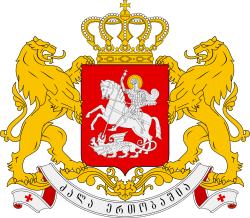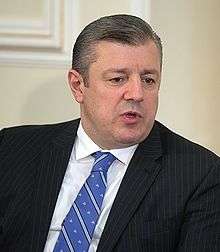Georgian parliamentary election, 2016
| | |||||||||||||||||||||||||||||||||||||||||||||||||||||||||||||||||||||
| |||||||||||||||||||||||||||||||||||||||||||||||||||||||||||||||||||||
| |||||||||||||||||||||||||||||||||||||||||||||||||||||||||||||||||||||
| |||||||||||||||||||||||||||||||||||||||||||||||||||||||||||||||||||||
 |
| This article is part of a series on the politics and government of Georgia |
|
Legislature |
|
Judiciary |
Parliamentary elections were held in Georgia on 8 October 2016 to elect the 150 members of Parliament. The ruling Georgian Dream coalition, led by Prime Minister Giorgi Kvirikashvili, sought a second term in office.[1][2] Opposition parties included the former ruling party and main opposition, the United National Movement (ENM); the Free Democrats, formerly a member of the Georgian Dream coalition and led by Irakli Alasania;[3] and the Alliance of Patriots of Georgia.[4]
Georgian Dream won 115 seats, an increase of 67 seats, while the United National Movement was reduced to 27 seats.
Electoral system
The 150 members of the unicameral Parliament are elected by two methods: 77 by proportional representation in a single nationwide constituency with an electoral threshold of 5%, and 73 by two-round system in single-member constituencies with majority rule requiring the winner to get over 50% (in previous election the first-placed candidate had to pass 30% threshold to win constituency seat).
Boundaries of constituencies were re-drawn to reduce malapportionment effect. Previously size of electorates ranged from less than 6,000 voters in one district to over 150,000 voters in another.[5]
The elections did not take place in constituencies in the breakaway regions of Abkhazia and South Ossetia.
Opinion polls
| Date | Polling firm/source | GD | UNM | OGFD | GLP | APG | CDM | DMUG | Girchi | SRP | SFP | Others | Lead |
|---|---|---|---|---|---|---|---|---|---|---|---|---|---|
| March–April 2016 | IRI | 19% | 18% | 10% | 7% | 3% | With DMUG | 3% | 12% | 3% | |||
| 1–3 April 2016 | GHN | 33% | 30% | 8% | 10% | 11% | 8% | 3% | |||||
| 23 February–14 March 2016 | NDI | 29% | 27% | 10% | 6% | 5% | <3% | <3% | <3% | 5% | 2% | ||
| 8–29 January 2016 | EPN Research | 31% | 20% | 9% | 9% | 23% | 7% | 2% | 8% | ||||
| 2015 | GHN | 20% | 27% | 33% | 4% | 6% | 3% | 2% | 6% | ||||
| 17 November–17 December 2015 | Newposts | 21% | 34% | 6% | 5% | 7% | 3% | 2% | 4.1% | 13% | |||
| 17 November–7 December 2015 | NDI | 31% | 21% | 11% | 7% | 5% | 4% | 2% | 10% | ||||
| November 2015 | EPF | 18% | 19% | 19% | 13% | 10% | Tied | ||||||
| 8 August–10 September 2015 | NDI | 26% | 30% | 6% | 7% | 3% | With DMUG | 6% | 3% | 6% | |||
| 27 March–19 April 2015 | NDI | 24% | 16% | 9% | 5% | 6% | 11% | 8% | |||||
| 3–28 February 2015 | IRI | 36% | 14% | 10% | 6% | 5% | 5% | 1% | 12% | ||||
| 23 July–7 August 2014 | NDI | 46% | 15% | 6% | 16% | 30% | |||||||
| 15 June 2014 | Local elections | 50% | 22% | 3% | 4% | 10% | 3% | 32% | |||||
| 26 March–18 April 2014 | NDI | 46% | 16% | 11% | 13% | 7% | 30% | ||||||
| 13–27 November 2013 | NDI | 65% | 15% | 6% | 6% | 8% | 4% | 51% | |||||
| 18 August–3 September 2013 | NDI | 56% | 16% | 7% | 7% | 12% | 4% | 40% | |||||
| 12–26 June 2013 | NDI | 55% | 13% | 22% | 32% | ||||||||
| 13–27 March 2013 | NDI | 63% | 13% | 15% | 48% | ||||||||
| 14–25 November 2012 | NDI | 66% | 13% | 10% | 7% | 53% | |||||||
| 1 October 2012 | Parliamentary elections | 53% | 40% | 2% | 2% | 1% | 13% |
Results
Georgian Dream declared victory soon after voting ended. Georgia Dream Prime Minister Giorgi Kvirikashvili told supporters at party headquarters that "I congratulate you with a big victory Georgia! According to all preliminary results, Georgian Dream is leading with a big advantage." Georgia Dream Deputy Prime Minister Kakha Kaladze added that the party's own data showed that it had won around 59 percent of the vote.
However, the United National Movement campaign head Nika Melia accused the government of vote rigging, saying "Votes have been stolen from us. We will defend our votes." Other parties such as Democratic Georgia, the Labour Party and the Alliance of Patriots also accused the government of massive vote rigging.[6]
| Party | Proportional | Constituency | Seats | ||||||
|---|---|---|---|---|---|---|---|---|---|
| Votes | % | Seats | Votes | % | Seats | Total | +/– | ||
| Georgian Dream | 856,638 | 48.68 | 44 | 71 | 115 | +67 | |||
| United National Movement | 477,053 | 27.11 | 27 | 0 | 27 | –19 | |||
| Alliance of Patriots of Georgia | 88,097 | 5.01 | 6 | 0 | 6 | New | |||
| Free Democrats | 81,464 | 4.63 | 0 | 0 | 0 | –8 | |||
| Democratic Movement – United Georgia | 62,166 | 3.53 | 0 | 0 | 0 | 0 | |||
| State for a People | 60,681 | 3.45 | 0 | 0 | 0 | New | |||
| Labour Party of Georgia | 55,208 | 3.14 | 0 | 0 | 0 | 0 | |||
| Republican Party | 27,264 | 1.55 | 0 | 0 | 0 | –9 | |||
| Industry Will Save Georgia-Our Fatherland | 13,788 | 0.78 | 0 | 1 | 1 | –5 | |||
| National Forum | 12,763 | 0.73 | 0 | 0 | 0 | –6 | |||
| Georgia for Peace | 3,824 | 0.22 | 0 | 0 | 0 | New | |||
| Georgian Idea | 2,916 | 0.17 | 0 | 0 | 0 | New | |||
| Tamaz Mechiauri - for United Georgia | 2,805 | 0.16 | 0 | 0 | 0 | New | |||
| Georgian Troupe | 2,182 | 0.12 | 0 | 0 | 0 | 0 | |||
| Communist Party | 1,757 | 0.10 | 0 | 0 | 0 | New | |||
| Our People, People's Party | 1,595 | 0.09 | 0 | 0 | 0 | 0 | |||
| Georgia | 1,548 | 0.09 | 0 | 0 | 0 | New | |||
| Road of Zviadi | 1,467 | 0.08 | 0 | 0 | 0 | New | |||
| United Communist Party of Georgia | 1,467 | 0.08 | 0 | 0 | 0 | New | |||
| Progressive Democratic Union | 1,010 | 0.06 | 0 | 0 | 0 | New | |||
| Merab Kostava Society | 966 | 0.05 | 0 | 0 | 0 | 0 | |||
| People's Authority | 810 | 0.05 | 0 | 0 | 0 | New | |||
| Our Georgia | 802 | 0.05 | 0 | 0 | 0 | New | |||
| Left-wing Alliance | 699 | 0.04 | 0 | 0 | 0 | New | |||
| Labour Socialist Party | 662 | 0.04 | 0 | 0 | 0 | New | |||
| Independent | 1 | 1 | |||||||
| Invalid/blank votes | – | – | – | – | – | – | – | ||
| Total | 1,759,632 | 100 | 77 | 73 | 150 | 0 | |||
| Registered voters/turnout | 3,613,851 | 51.6 | – | – | – | – | |||
| Source: CEC Civil.ge | |||||||||
References
| Wikimedia Commons has media related to Georgian parliamentary election, 2016. |
- ↑ "Georgian Dream starts preparations for Elections 2016". Rustavi 2. 19 January 2015. Retrieved 15 February 2015.
- ↑ Kakachia, Kornely (12 January 2015). "The end of the Georgian dream". openDemocracy. Retrieved 15 February 2015.
- ↑ "Alasania Becomes FD's Chairman, Hopes to 'Celebrate Victory' in 2016 Elections". Civil Georgia. 8 November 2014. Retrieved 15 February 2015.
- ↑ "Local Elections Boost Alliance of Patriots' Ambitions for Parliamentary Polls". Civil Georgia. 21 June 2014. Retrieved 15 February 2015.
- ↑ Elections Guide Civil.ge
- ↑ Georgia ruling party leads in parliamentary polls: Early results Press TV, 9 October 2016


